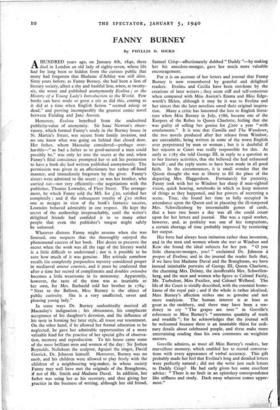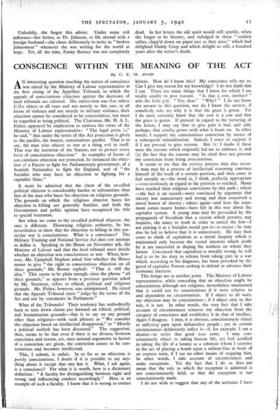FANNY BURNEY
By PHYLLIS D. HICKS
A HUNDRED years ago, on January 6th, 1840, there died in London an old lady of eighty-seven, whose life had for long been so hidden from the curious public that many had forgotten that Madame d'Arblay was still alive. Sixty years before, as Fanny Burney, she had been a lion of literary society, albeit a shy and bashful lion, when, at twenty- six, she wrote and published anonymously Evelina ; or the History of a Young Lady's Introduction to the World. Few books can have made so great a stir as did this, coming as it did at a time when English fiction " seemed asleep or dead," and proving incomparably the greatest comic novel between Fielding and Jane Austen.
Moreover, Evelina benefited from the undoubted publicity-value of anonymity. Sir Isaac Newton's obser- vatory, which formed Fanny's study in the Burney house in St. Martin's Street, was secure from family invasion, and no one knew what was going on behind that closed door. Her father, whom Macaulay considered—perhaps over- harshly—" as bad a father as so good-natured a man could possibly be," was only let into the secret at the end, when Fanny's filial conscience prompted her to ask his permission to have a book she had written published anonymously. The permission was given in an affectionate but rather off-hand manner, and immediately forgotten by the giver. Fanny's sisters were admitted to the secret ; so was her brother, who carried out—not very efficiently—the negotiations with the publisher, Thomas Lowndes, of Fleet Street. The arrange- ment, by which Fanny sold the 'MS. for £20, satisfied her completely ; and if the subsequent royalty of £m0 strikes one as meagre in view of the book's fantastic success, Lowndes behaved admirably in one respect. He kept the secret of the authorship irreproachably, until the writer's delighted friends had confided it to so many other people that even the publisher's tongue might safely be unloosed.
Whatever distress Fanny might assume when she was lionised, one suspects that she thoroughly enjoyed the phenomenal success of her book. Her desire to preserve the secret when the work was all the rage of the literary world is a little difficult to understand ; nor is it possible to be sure how much of it was genuine. Her attitude somehow recalls the completely purposeless mystery considered proper in mediaeval amour courtois, and it must be confessed that after a time her record of compliments and doubles entendre becomes a little wearisome in its monotony. Apparently, however, the taste of the time was as insatiable as her own, for Mrs. Barbauld told her brother in 1784: " Next to the Balloon, Miss Burney is the object of public curiosity. She is a very unaffected, sweet and pleasing young lady."
In some ways Dr. Burney undoubtedly merited all Macaulay's indignation ; his obtuseness, his complacent acceptance of his daughter's devotion, and the influence of his taste in forming her later style, all rouse our resentment. On the other hand, if he allowed her formal education to be neglected, he gave her admirable opportunities of a more valuable kind for the practice of her special gifts of observa- tion, memory and reproduction. To his house came some of the most brilliant men and women of the day: Sir Joshua Reynolds, Nollekens the sculptor, Agujari the singer, David Garrick, Dr. Johnson himself. Moreover, Burney was no snob, and his children were allowed to play freely with the children of a neighbouring wig-maker, in whose society Fanny may well have met the originals of the Branghtons, if not of Mr. Smith and Madame Duval. In addition, her father was using her as his secretary, and thus giving her practice in the business of writing, although her old friend, Samuel Crisp—affectionately dubbed " Daddy "—by making her his anecdote-monger, gave her much more valuable encouragement.
For it is on account of her letters and journal that Fanny Burney is now remembered by grateful and delighted readers. Evelina and Cecilia have been outshone by the creations of later writers ; they seem stiff and self-conscious when compared with Miss Austen's Emma and Miss Edge- worth's Helen, although it may be it was to Evelina and her sisters that the later novelists owed their original inspira- tion. Many a critic has lamented the loss to English litera- ture when Miss Burney in July, 1786, became one of the Keepers of the Robes to Queen Charlotte, feeling that she was guilty of selling her genius for kzoo a year " with emoluments." It is true that Camilla and The Wanderer, the two novels- produced after her release from Windsor, are unreadable, being written in some of the worst English ever perpetrated by man or woman ; but it is doubtful if her sojourn at Court was really responsible for this. As early as 1785 she told George Ill, in reply to a question as to her literary activities, that she believed she had exhausted herself ; and the reply seems to have been made in all good faith. In the circumstances, it is small wonder that the Queen thought she was at liberty to fill the place of the departing Mrs. Haggerdom. Fortunately for posterity, Fanny took with her to Windsor her sharp if near-sighted vision, quick hearing, notebooks in which to keep minutes of things as they happened, and her powers of recreating a scene. True, she found her time so fully occupied in attendance upon the Queen and in placating the ill-tempered Mrs. Schwellenberg by interminable games of cards, that a bare two hours a day was all she could count upon for her letters and journal. She was a rapid worker, however, and, as prolixity was one of her temptations, a certain shortage of time probably improved by restricting her output.
Her forte had always been imitation rather than invention, and in the men and women whom she met at Windsor and Kew she found the ideal subjects for her pen. " 0 you little character-monger, you I " exclaimed Dr. Johnson a propos of Evelina; and in the journal the reader feels that, if we have lost Madame Duval and the Branghtons, we have instead inimitable portraits of George III, Queen Charlotte, the charming Mrs. Delany, the insufferable Mrs. Schwellen- berg, and the men and women who figure as Colonel Fairly, Mr. Turbulent, Miss Fuzilier, and Colonel Welbred. The life of the Court is vividly described, with the essential home- liness of the royal pair ; and if the whole is rather idealised, Miss Burney's affection strikes one as genuine and not mere toadyism. The human interest is at least as great as the snobbery, and there may have been a ten- dency to cry " The grapes are sour " in Greville's references to Miss Burney's " enormous quantity of- trash and twaddle "; for he acknowledges that the journal will be welcomed because there is an insatiable thirst for ordi- nary details about celebrated people, and these make more entertaining reading than his own comments on weightier matters.
Greville admires, as must all Miss Burney's readers, her, marvellous memory, which enabled her to record conversa- tions with every appearance of verbal accuracy. This gift probably made her feel that Evelina's long and detailed letters were perfectly natural ; did not she write just such letters to Daddy Crisp? He had early given her some excellent advice: " There is no fault in an epistolary correspondence like stiffness and study. Dash away whatever comes upper- most." Unluckily, she forgot this advice. Under some evil influence—her father, or Dr. Johnson, or life abroad with a foreign husband—she chose deliberately to write in " broken Johnsonese " whenever she was writing for the world at large. Yet, all the time, Fanny Burney was not completely dead. In her letters the old spirit would still sparkle, when she forgot to be literary, and indulged in those " sudden sallies, clapp'd down on paper just as they arise," which had delighted Daddy Crisp and which delight us still, a hundred years after the writer's death.



































 Previous page
Previous page